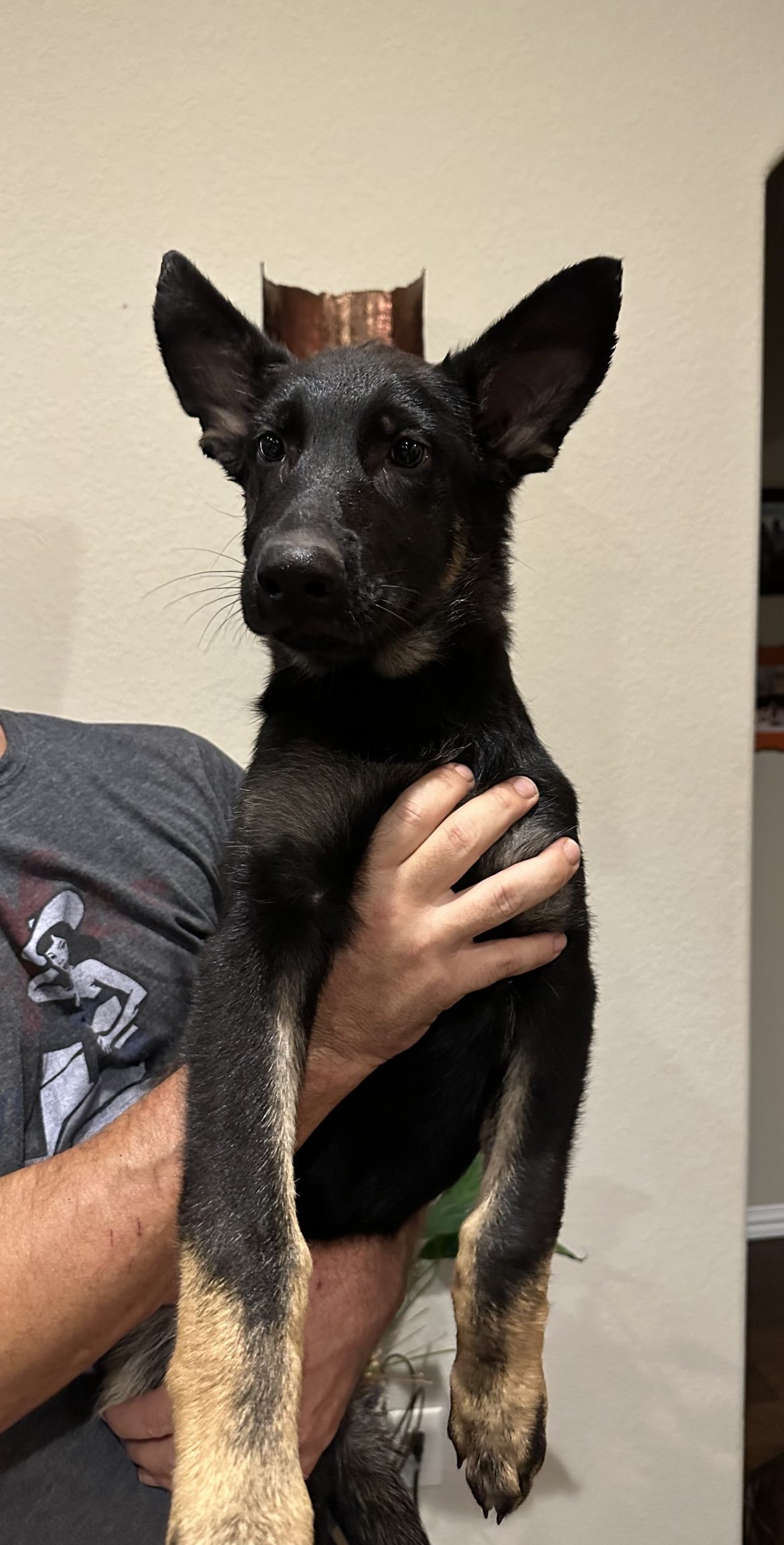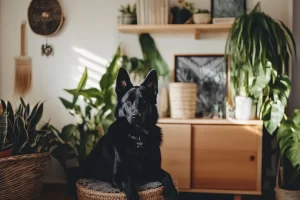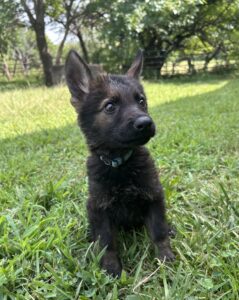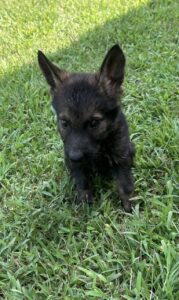Potty Training an older German Shepherd puppy
The concept of an “almost housebroken” puppy is a misnomer because housebreaking is an absolute state: a puppy either understands to eliminate solely outdoors or it does not. A housebroken puppy will consistently and reliably avoid using the indoors as a toilet, understanding that outside is the only appropriate place for such activities. The idea of being “almost” housebroken suggests inconsistency, where occasional indoor accidents still occur. This inconsistency highlights that the puppy has not fully grasped the training, making it clear that more consistent and effective training methods are needed.
The process of housebreaking involves creating strong, consistent associations between the puppy’s need to eliminate and designated outdoor spots. This requires diligent monitoring, timely outings, positive reinforcement, and, importantly, preventing any indoor accidents that could set back progress. Allowing for an “almost” status confuses the training goals and delays achieving complete housebreaking. Therefore, proclaiming a puppy as almost housebroken undermines the objective of reliable, accident-free behavior. Instead, the focus should be on achieving full housebreaking, where the puppy confidently and consistently signals its need to go outside, thus avoiding any indoor mishaps. This clarity in training ensures a harmonious living environment and a well-adjusted pet that understands and adheres to the house rules.
Taking the dog outside does not necessarily mean it understands the purpose behind this action. The fundamental issue lies in the lack of communication between the dog and the owner. Dogs have a strong desire to please, but they do not instinctively know how to do so.
Housebreaking, in theory, is straightforward. It involves preventing the puppy from eliminating indoors and giving it the opportunity to do so outside. It also entails teaching the dog to communicate its need to go outside and respond appropriately when prompted. Dogs, being creatures of habit that learn through association, will quickly grasp that the only acceptable place to relieve themselves is outdoors if trained consistently. A well thought out socializing strategy for your German Shepherd puppies will necessarily includes potty training.
Using Dog Crates for Housebreaking Your German Shepherd Puppy
We have written previously on the use of crates in potty training puppies. You can see some o those articles here and here. But before we get into best practices on potty training an older German Shepherd puppy, a few words on crate sizing. Selecting the appropriate crate size is crucial for successfully potty training a puppy. The crate must be just large enough to allow the puppy to stand up, turn around, and lie down comfortably. Too much space can hinder the training process, as it allows the puppy to designate a sleeping area and a separate area for elimination. When the crate is appropriately sized, it leverages a dog’s natural instinct to avoid soiling its sleeping quarters, promoting the habit of holding it until taken outside. Many crates come with adjustable dividers to accommodate a puppy’s growth, allowing the crate to maintain a proper size without needing frequent replacements. Ensuring the crate is not too spacious encourages the puppy to treat the entire space as its den, reinforcing the housebreaking process. When coupled with a consistent routine of taking the puppy outside at regular intervals—especially after meals, play, and sleep—the crate becomes an effective tool for teaching proper elimination habits. Proper crate sizing also helps in preventing anxiety and establishing a safe, secure environment where the puppy can rest and relax. A well-sized crate, along with positive reinforcement techniques and patience, lays the foundation for successful potty training and a well-adjusted adult dog. By investing time and thought into the correct crate dimensions, owners can streamline the housebreaking process and foster a positive training experience for their puppies.
One natural instinct we leverage is the dog’s desire to keep its sleeping area clean. We provide a den-like environment in the form of a dog crate, which becomes the dog’s bed. If appropriately sized, the dog will not soil the crate. While puppies may initially resist this confinement, they typically accept it within a few days.
Your German Shepherd puppy is at heart a pack animal. In the wild, a dog will naturally seek shelter in dens for safety and security. At home, dogs often create their own dens: under desks, behind couches, or in closets. A dog crate serves as a natural and safe bed, offering the dog a sense of protection and the owner peace of mind.
Contrary to some beliefs, confining a dog to a crate is not cruel. It caters to the dog’s instinctual desire for a safe, secure space. In nature, dogs seek out secure enclosures like caves or tree trunks to rest, avoiding open fields where they are vulnerable to predators. Proper crate use fulfills this fundamental need.
Some puppies may vocalize their distress when first placed in a crate, but it is crucial to ignore this behavior. Consistency in handling these initial reactions will lead to the puppy accepting the crate as a natural part of its environment. To help this transition, a treat can be tossed into the crate, creating a positive association.
As the dog ages, it should respond to the “crate” command independently. This training lays the foundation for instructing the dog to go to its crate during various situations, such as when guests arrive.
Establish a Consistent Routine
Establishing a consistent housebreaking routine is essential. Dogs must be taken outside immediately upon waking, after meals, and after play. Use a cue such as “good outside” to reinforce outdoor elimination. Allow the dog brief indoor freedom only under supervision, gradually extending this freedom as the dog demonstrates reliability.
A puppy should not have unsupervised access to the house. Close supervision prevents accidents and reinforces correct behavior. An unsupervised puppy will quickly develop bad habits. Build bad habits and now your training task is doubly difficult.
Puppies typically need to relieve themselves first thing in the morning. Promptly take them outside, and once they have eliminated, allow controlled freedom indoors. Incorporate meal times into the routine, consistently taking the dog outside afterward. Exercise will stimulates elimination. Consider five minutes of exercise early each morning.
Managing Mistakes, Correct Bad Behavior, Wash, Rinse and Repeat
Housebreaking success hinges on consistency and patience. Puppies are not to be punished for indoor accidents unless caught in the act. Immediate correction involves interrupting the behavior and taking the dog outside. Praise outdoor elimination and ignore indoor accidents that were not witnessed.
Puppies might exhibit seemingly guilty behavior after accidents, but this is a response to previous punishment, not a sign of spite. Consistent positive reinforcement is key to eliminating accidents.
For dogs needing frequent nighttime outings, reduce water intake in the evening and ensure adequate pre-bedtime exercise. Crate the dog for sleep, and if noise becomes an issue, consider relocating the crate to a quieter space with background noise like a radio.
Avoid Paper Training At All Costs
Paper training should be avoided as it confuses the dog with mixed signals about acceptable elimination spots. Dogs learn by association, and allowing indoor elimination on paper undermines the goal of housebreaking. Use an outdoor spot exclusively.
Dealing with Resistant Pups
Occasionally, puppies may resist housebreaking due to prior living conditions. Consistent application of housebreaking techniques, despite setbacks, is crucial. Dogs with difficult beginnings may require more patience and effort but can eventually learn proper behavior.
Consider the Role of Diet in Bowel Movement Frequency
Understand the impact of diet on housebreaking. For instance, commercial kibble digests slower than an all-natural diet, affecting elimination timing. Researching and considering a natural diet can aid in housebreaking.
Final Practical Tips and Tools
Use odor neutralizers to clean up indoor accidents, eliminating any residual scent that might attract the dog back to the same spot. Indoor spray repellent can also deter repeat accidents. Appropriate correction involves verbal reprimands only if the German Shepherd puppy is caught in the act. Physical punishment or outdated practices like rubbing a dog’s nose in its mess are ineffective and harmful.
Conclusion
Housebreaking requires effort and consistent application of effective methods. Utilize dog crates to foster a den-like environment, establish a clear, understandable path for your German Shepherd puppy to get potty trained. Be consistent. Avoid outdated practices that confuse and stress the dog. With dedication, any dog can be successfully housebroken, leading to a harmonious living environment free from indoor accidents. For further guidance on training your German Shepherd puppy, see the articles Czech Working Line regularly publishes on dog training here.




